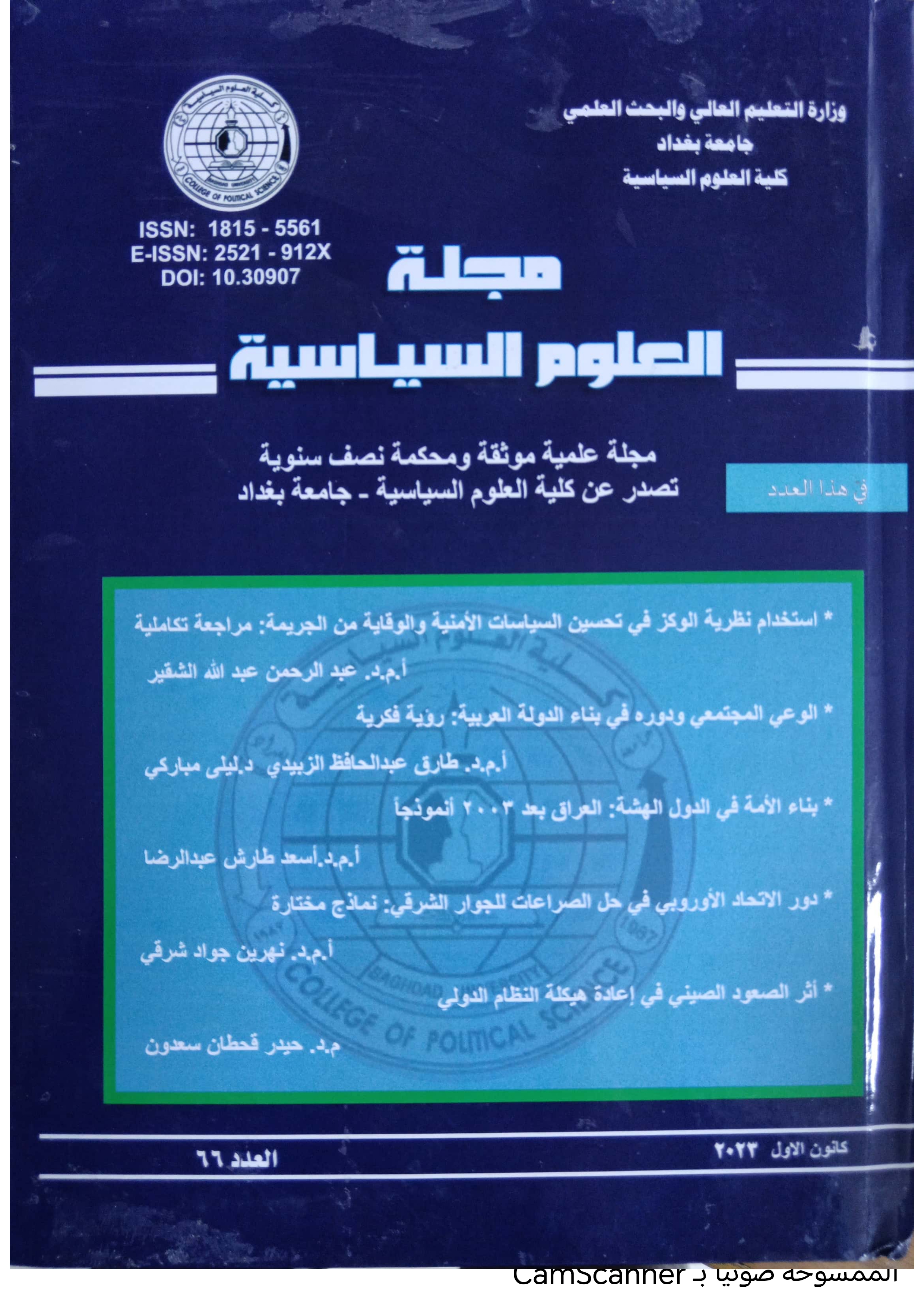Abstract
The "Nudge" Theory is considered one of the most recent theories, which is clear in the economic, health, and educational sectors, due to the intensity of studies on it and its applications, but it has not yet been included in crime prevention studies. The use of Nudge theory appears to enrich the theory in the field of crime prevention, and to provide modern, effective, and implementable mechanisms.
The study deals with the "integrative review" approach, which is a distinctive form of research that generates new knowledge on a topic through reviewing, criticizing, and synthesizing representative literature on the topic in an integrated manner so that new frameworks and perspectives are created around it.
The study is based on the literature of behavioral economics, with a focus on three basic and recent theories: nudges, fast and slow thinking, and chaos bias. All of them confirm that the ordinary person acts spontaneously, and makes his daily decisions according to what is available, without thinking and contemplation. Thus, they bear characteristics that the security researcher can employ in preventing crime and designing security policies.
Many of the results of studies using poke and behavioral economics theories in crime prevention emphasized the reduction of crime rates, and yielded positive results in preventing crime, rather than combating it, especially in the field of urban planning, shop design, afforestation, lighting, and paving of streets, which encourages the turnout of individuals to it and causes a natural social interaction that prevents the criminal from being motivated to commit his crime.
The study recommends giving more attention to studies about uses of the nudge theory, developing the design of security policies in crime prevention, and supporting modern security studies and security policy studies.
The study deals with the "integrative review" approach, which is a distinctive form of research that generates new knowledge on a topic through reviewing, criticizing, and synthesizing representative literature on the topic in an integrated manner so that new frameworks and perspectives are created around it.
The study is based on the literature of behavioral economics, with a focus on three basic and recent theories: nudges, fast and slow thinking, and chaos bias. All of them confirm that the ordinary person acts spontaneously, and makes his daily decisions according to what is available, without thinking and contemplation. Thus, they bear characteristics that the security researcher can employ in preventing crime and designing security policies.
Many of the results of studies using poke and behavioral economics theories in crime prevention emphasized the reduction of crime rates, and yielded positive results in preventing crime, rather than combating it, especially in the field of urban planning, shop design, afforestation, lighting, and paving of streets, which encourages the turnout of individuals to it and causes a natural social interaction that prevents the criminal from being motivated to commit his crime.
The study recommends giving more attention to studies about uses of the nudge theory, developing the design of security policies in crime prevention, and supporting modern security studies and security policy studies.
Keywords
Crime
crime prevention
nudge.
security
Abstract
يعد (الوكز) من النظريات الجديدة التي تعد واضحة في القطاع الاقتصادي والصحي والتعليمي؛ نظرًا لكثافة الدراسات حوله وتطبيقاته، إلا إنّه لم يدخل حتى الآن في دراسات الوقاية من الجريمة، ويأتي مقترح استعمال نظرية الوكز في الوقاية من الجريمة من أجل تصميم سياسات أمنية فاعلة وبتكلفة أقل، وتنفيذها بأساليب غير مادية، ومن أجل إثراء التنظير في مجال الوقاية من الجريمة، وتقديم آليات عصرية وفعّالة وقابلة للتنفيذ.
وقد عالجت الدراسة موضوعها بمنهج (المراجعة التكاملية) الذي يعد شكلًا مميزًا من أشكال البحث التي تولد معرفة جديدة حول موضوع ما من طريق مراجعة وانتقاد وتوليف الأدبيات حول الموضوع بطريقة متكاملة بحيث يجري إنشاء أطر ووجهات نظر جديدة حوله.
وقد استندت الدراسة إلى أدبيات علم الاقتصاد السلوكي، مع التركيز على ثلاث نظريات أساسية وحديثة، هي: الوكز، والتفكير السريع والبطيء، وفوضى التحيز. وجميعها تؤكد أنّ الإنسان العادي يتصرف بتلقائية، ويتخذ قراراته اليومية وفق المتاح، من دون التفكير والتأمل، وهي بهذا تحمل سمات يمكن للباحث الأمني أن يوظفها في الوقاية من الجريمة، وتصميم السياسات الأمنية.
وأكدت كثير من نتائج دراسات استعمال الوكز ونظريات الاقتصاد السلوكي في الوقاية من الجريمة خفض معدلات الجريمة، وأثمرت عن نتائج إيجابية من الوقاية من الجريمة، بدلًا من مكافحتها، وبخاصة في مجال التخطيط الحضري وتصميم المتاجر وتشجير الشوارع وإنارتها ورصفها، ممَّا يشجع على إقبال الأفراد عليها، ويُحدث تفاعلًا اجتماعيًّا طبيعيًّا يمنع من تحفيز المجرم على ارتكاب جريمته.
وتوصي الدراسة بمنح المزيد من الاهتمام بدراسة استعمالات نظرية الوكز، وتطوير تصميم السياسات الأمنية في الوقاية من الجريمة، ودعم الدراسات الأمنية الحديثة، ودراسات السياسات الأمنية.
وقد عالجت الدراسة موضوعها بمنهج (المراجعة التكاملية) الذي يعد شكلًا مميزًا من أشكال البحث التي تولد معرفة جديدة حول موضوع ما من طريق مراجعة وانتقاد وتوليف الأدبيات حول الموضوع بطريقة متكاملة بحيث يجري إنشاء أطر ووجهات نظر جديدة حوله.
وقد استندت الدراسة إلى أدبيات علم الاقتصاد السلوكي، مع التركيز على ثلاث نظريات أساسية وحديثة، هي: الوكز، والتفكير السريع والبطيء، وفوضى التحيز. وجميعها تؤكد أنّ الإنسان العادي يتصرف بتلقائية، ويتخذ قراراته اليومية وفق المتاح، من دون التفكير والتأمل، وهي بهذا تحمل سمات يمكن للباحث الأمني أن يوظفها في الوقاية من الجريمة، وتصميم السياسات الأمنية.
وأكدت كثير من نتائج دراسات استعمال الوكز ونظريات الاقتصاد السلوكي في الوقاية من الجريمة خفض معدلات الجريمة، وأثمرت عن نتائج إيجابية من الوقاية من الجريمة، بدلًا من مكافحتها، وبخاصة في مجال التخطيط الحضري وتصميم المتاجر وتشجير الشوارع وإنارتها ورصفها، ممَّا يشجع على إقبال الأفراد عليها، ويُحدث تفاعلًا اجتماعيًّا طبيعيًّا يمنع من تحفيز المجرم على ارتكاب جريمته.
وتوصي الدراسة بمنح المزيد من الاهتمام بدراسة استعمالات نظرية الوكز، وتطوير تصميم السياسات الأمنية في الوقاية من الجريمة، ودعم الدراسات الأمنية الحديثة، ودراسات السياسات الأمنية.
Keywords
الأمن، الوقاية من الجريمة، الجريمة، الوكز
